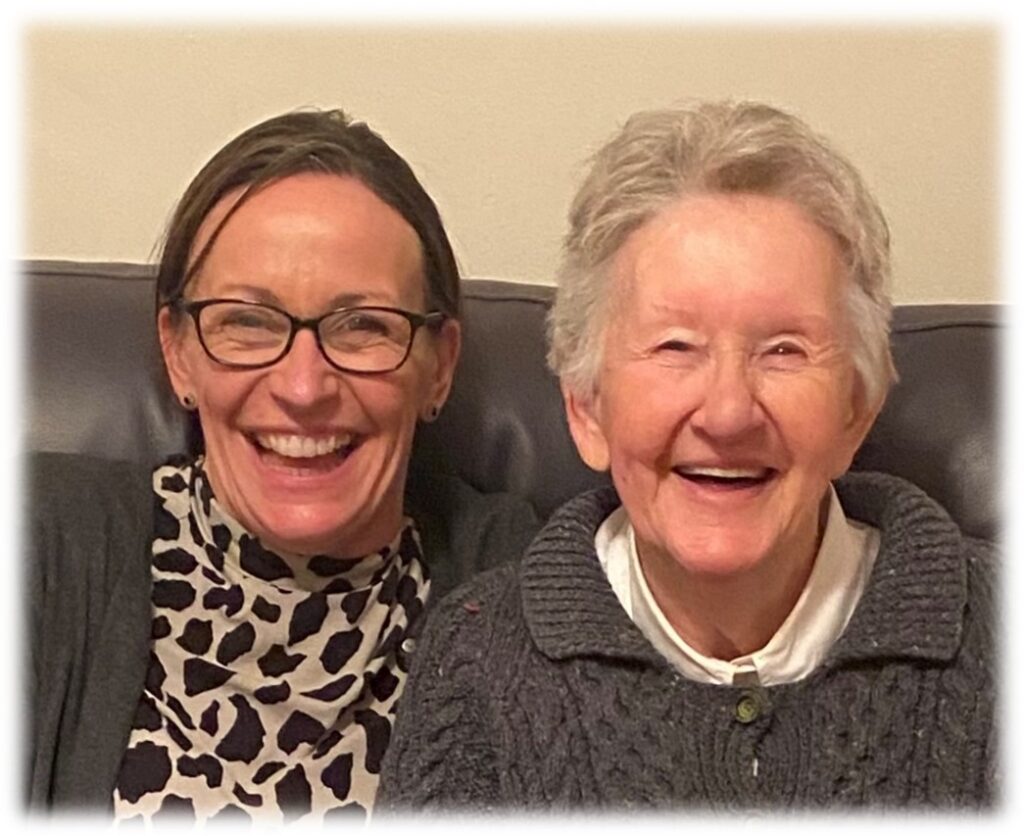We have supported Professor Myra Conway in her research into dementia since 2019. Her mother was diagnosed with a form of vascular dementia at which point Myra’s work became personal and the human dimension was real. Myra offered to tell us the story of her Mam – a “Scientist’s Personal Reflection”.
“As a researcher dedicated to understanding the pathophysiology of Alzheimer’s disease (AD) and other dementias, my work has long focused on exploring how diet and nutrition might influence the progression of these complex conditions. I’ve been fortunate to investigate the role that diet and lifestyle factors may play in delaying or modifying disease onset. However, it wasn’t until I faced dementia in my own family that I truly began to understand the broader, deeply human dimensions of this illness.

Throughout my academic career, I attended countless conferences—many of them public-facing—and often found myself frustrated. Despite compelling scientific advancements, sessions focused on public health and social care seemed to draw larger crowds than the data-heavy research presentations I championed. I see now that I was missing something crucial. As the saying goes, “walk a mile in someone else’s shoes.” It took my own mother’s decline for me to fully appreciate why families gravitate toward discussions about day-to-day care rather than abstract molecular mechanisms.
My mother battled Small Vessel Cerebral Vascular Disease (CSVD), a form of vascular dementia less defined than Alzheimer’s and often misunderstood. The early signs were subtle. She would search for words mid-sentence—something we laughed off as playing “Blankety Blank,” a nod to a favorite quiz show with Terry Wogan. But after a serious fall, I noticed a more pronounced deterioration in her speech. Then came Covid. Distance and lockdowns separated us, and over phone calls, I heard the slow but clear progression of her cognitive decline. She cleverly used the pandemic as a shield, keeping visits at bay, perhaps out of fear or denial.
By the time we were finally able to visit, years had passed. My children and I walked into her home, and her look of worry said it all. She couldn’t quite place my son, though she sensed familiarity. That moment was heartbreaking—and just the beginning of many more. Her final fall left her injured and fully dependent. My mother, once vibrant and sharp, was now in the final, brutal stages of a disease that steals piece by piece.
Living in the UK while my Mam was in Ireland added complexity, but my siblings were incredible caregivers. I was drawn deeply into the world of dementia care, confronting firsthand the limitations—and sometimes the harm—of pharmacological treatments. One such experience was when an Alzheimer’s medication was prescribed for her CSVD, triggering severe episodes of psychosis. Thankfully, based on discussions with the medics, it was discontinued, and the psychosis ceased. But by then, we were only managing symptoms, not altering the course.
Watching my mother lose her words, her mobility, her ability to swallow—and finally her spark—was devastating. Yet what endured was her resilience. In her silence, I saw strength.
Her journey has reshaped my perspective and consolidated my research approach. We must shift focus toward prevention. Diet, exercise, and lifestyle must be central to dementia research. We need to better understand the connectivity between cardiovascular health and brain health. We need to better understand the long-term effects of medications that are used to treat conditions such as cardiovascular disease and study the impact of age on drug metabolism. It’s time we invest more into how we live, not just why we fall ill.
In memory of my mother—and for all families walking this journey—we must do better.“
We are sure you will have been moved by Myra’s story, as we have, and admire her for the candour and courage to share this very personal experience. Myra has drawn back the curtain and given us an insight that has taken our understanding to new places. We are talking about real people and the impact this disease has on them and those they love.